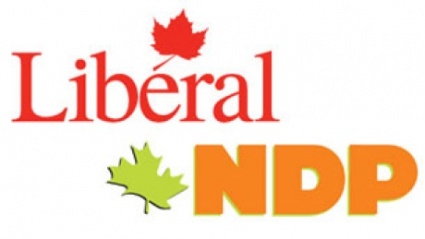June 22, 2015
Are the Liberals good alternatives to Harper?

In its 6-months poll - Are the Liberals good alternatives to Harper? - the Canadian Charger found the percentage of readers who answered yes has been decreasing. And in mid-May, an EKOS Research poll showed that the Liberal Party has for the first time since Justin Trudeau became leader two years ago slipped below the Conservative Party. Meanwhile the NDP have gained enough support to make the race for the October federal election a virtual tie, with just three points separating the Conservatives, the NDP, and the Liberals.
The NDP jumped five percentage points over the last second to last week of May, so the story appears to be one of NDP success.
With a comfortable lead in the polls for so long, Mr. Trudeau seems to be reluctant to take a stand against Conservative Party policies which polls show are popular with Canadians – particularly Conservative voters - such as Bill C-51.
In both cases the Liberals failed to take a clear stand for or against. In going to war in Iraq, the Conservatives made a substantive case for, and the NDP made a substantive case against, while the Liberals never really got past their claim that “the government had failed to make a case for war.”
Meanwhile, although a number of polls show the overwhelming majority of voters support the recently passed Bill C-51 - which they believe will keep them safe from terrorists - a broad coalition of experts have issued warnings against the bill; and there are now reports of growing opposition to the bill. One April poll found a majority of Canadians actually opposed the bill.
Breaking down EKOs Research poll into various categories such as region, gender, age and education level, there appear to be two prevailing trends that are driving NDP fortunes.
The first is a dramatic capture of the university-educated vote, which was critical to the Alberta NDP’s historic victory recently. The second factor is a decisive lead in Quebec, where the NDP was neck and neck with the Liberals. The NDP is also newly competitive in Ontario, which is now a three-way race.
Despite the Liberals slipping in the polls, the EKO Research's poll indicates that Liberal Leader Trudeau remains high in the polls; in fact, he has seen a modest rise in his approval rating over the past few polls.
Meanwhile, Mr. Mulcair’s approval is actually down slightly from last month, suggesting that the NDP rise is linked to factors other than the party’s leader.
It may be interesting to see whether Mr. Mulcair receives more critical scrutiny now that he is part of this new three-way tie.
Although most commentators are impressed with Mr. Mulcair's performance in Question Period as his incisive questioning continuously holds Prime Minister Harper's feet to the fire – perhaps one reason why Mr. Harper seldom shows up for Question Period – many of these same commentators question whether he can hold the NDP gains in Quebec, which many people attribute to the likeable personality of his predecessor Jack Layton.
Meanwhile, Stephen Harper’s approval rating is down sharply, as is the directional approval of the federal government, which has reached a new low for this year.
Mr. Harper's party now finds itself virtually in a three-way tie with the Liberals and the NDP, ten points below where he was in the 2011 election when he won a majority government for the first time.
Moreover, this challenging position exists in spite of the fact that Mr. Harper and the Conservatives have clearly owned the airwaves and the podium, spending millions of taxpayers' dollars promoting themselves and their policies.
Almost all polls show that as many as seven in 10 Canadians are — right now — are not going to vote for the incumbent Stephen Harper government.
Although he won a majority in 2011 with six in 10 Canadians voting for other parties, he received a big boost from then Liberal Party leader Michael Ignatieff – one of the few people in Canadian politics who could actually make Mr. Harper's personality seem appealing.
This is in sharp contrast to Mr. Trudeau, whose personality is far more appealing to voters than either Mr. Harper's or Mr. Mulcair's.
Historian John English – author of several biographies of Canadian Prime Ministers – said “personality trumps policy in politics. “








